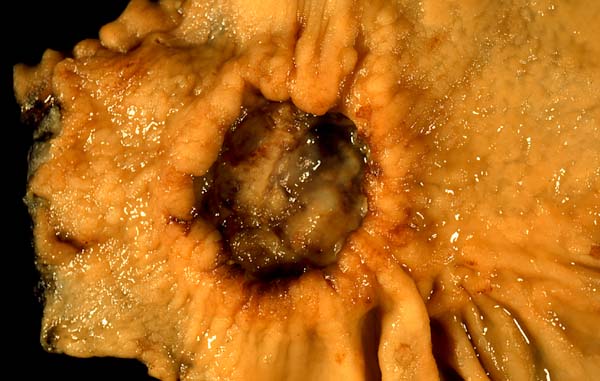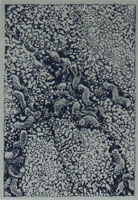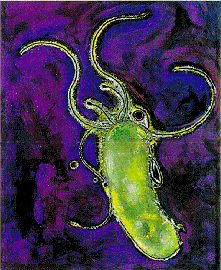Having Stomach Pains??

Helicobacter
pylori caused gastric cancer in a 40 year old woman.
Helicobacter pylori lives in the gastric (stomach) region of humans and has been found to be associated with many disorders in the gastric area including chronic superficial gastritis, chronic active gastritis, peptic ulcer disease, and even gastric cancer. When first infected, the patient develops chronic superficial gastritis. This is an infection of the mucous layer only, with no affect on the epithelial cells. If it is left untreated, this condition will probably span the rest of the patient's life. This condition can, however, develop into chronic active gastritis, which is an inflammation of the stomach's epithelial cells below the mucous layer. Because this affects the cells, the condition of chronic active gastritis can develop into gastric cancer. The bacteria do not actually invade the cells but rather release chemicals that these tissues absorb. It is these chemicals that cause inflammation of the tissues. Few patients, however, actually develop chronic active gastritis, peptic ulcer disease, or gastric cancer from H. pylori infections.

H. Pylori in mucous layer
According to a National Institutes of Health (NIH) consensus statement, nearly all people with a gastric ulcer are infected with H. pylori. However, not all stomach ulcers are caused by Helicobacter pylori. Some ulcers can be caused by other means, including some anti-inflammatory medications such as aspirin (Blaser 1996).
Treating H. pylori infections
If you are diagnosed with this infection, your doctor will prescribe a tri-antimicrobial regimen, as prescribed by the NIH. This prescription will consist of bismuth subsalicylate, tetracycline, and metronidazole taken over a two week span. This combination of drugs has proven to be about 90% effective. Use of these antibiotics will cure the infection; however, this can also lead to bacterial resistance to the drugs. To help prevent this from happening, these drugs are used restrictively, and the patient must take all of the drugs given to kill all of the bacteria.
To learn some more interesting facts about Helicobacter pylori, click here.
